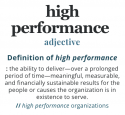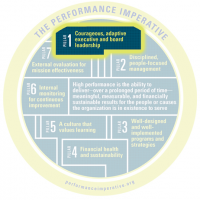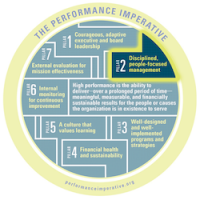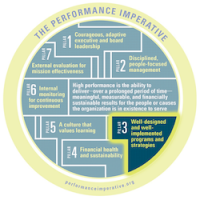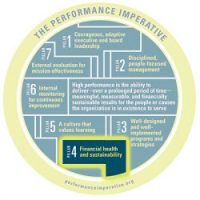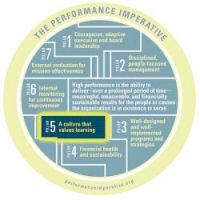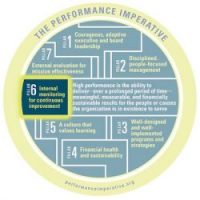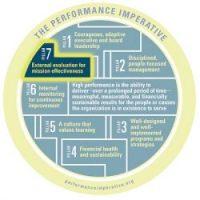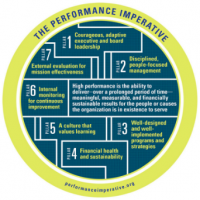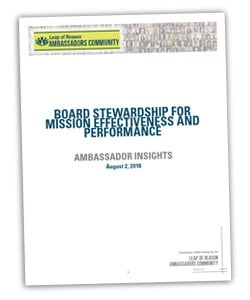Just as boards have fiduciary responsibilities to provide stewardship, ensure compliance, and hold management accountable for legal, financial, investment, and audit requirements, there is a growing need to apply this same focus and rigor to their organizations’ mission effectiveness and performance. There are myriad approaches for how boards can ensure that mission effectiveness and performance are priorities, ranging from reporting key performance metrics at each board meeting; to organizing a board sub-committee to focus on quality, safety, and patient experience at a healthcare organization; to forming a working group of board and staff tasked with establishing a framework for the scope, structure, and metrics for assessing mission effective and performance; to allotting time for conversations about effectiveness and performance as part of every meeting agenda. Like other disciplines described in the Performance Imperative framework, boards should view becoming stewards of mission effectiveness and performance as an core responsibility that takes time and focused intention.
Leap Ambassadors shared lessons to consider whether you’re completely new to the idea of incorporating mission effectiveness a cornerstone of your board’s responsibilities or further along the path.
Make mission effectiveness, outcomes, and evaluation a board priority
If effectiveness and performance topics aren’t a regular part of board meeting agendas, Chiku Bernardi, investment director at Impetus-PEF, suggests initiating a conversation with the board chair about the importance of including organizational performance and evaluation as a discussion topic. Once the chair is onboard, be sure to include dedicated sessions to educate board members so they can ask good questions. Joe McCannon, co-founder of Shared Nation, finds that sharing articles on governance and boards, such as these from the Institute for Healthcare Improvement can spark discussion and trigger ideas.
Chip Edelsberg, former executive director of the Jim Joseph Foundation, shared that the Joseph Foundation board adopted a guideline in its 2006 strategic plan that up to 10% of any major grant (defined then as $1M) could/should be allocated for evaluation. The Foundation’s outcomes/results orientation, expressed in the logic models developed for its agreed-upon grantmaking strategic priorities, was routinely used for board updates and discussion on grantee performance.
As boards add new members, Gregg Behr, executive director of the Grable Foundation, recommends ensuring that board candidates embrace (or are predisposed to) a culture of mission effectiveness and performance.
And Woody McCutchen, Managing Director, Blue Meridian Partners and the Edna McConnell Clark Foundation, urges boards to have a conversation sparked by this question from the “Performance Practice”: Do your organization’s board members routinely review research and engage in learning opportunities that can help you improve your organizational effectiveness, produce improved results, and/or reduce costs without compromising quality?
Define the scope and structure of the committee/sub-committee
Several ambassadors emphasized the importance of establishing a charter that clearly states the committee’s purpose, its objectives, its measure of success, and any definitions (e.g., will the group look only at external evaluation, internal continuous improvement, or both?). Ellen Bass, director of the Capacity Institute, says, “What’s in a name? Each committee has a different name and slant on the board’s role to ensure that strategy meets the mission. This variety is fine, as long as the board takes the task seriously, per the Performance Imperative’s Pillar 1, Principle 1.1 (Executives and boards embrace their responsibility to deliver meaningful, measurable, and financially sustainable results). This means at a minimum, defining the mission and strategy and gathering data on progress for improvement.” (See Appendix for a sample list of questions to consider)
Terri Sorensen, president of Friends of the Children (FOTC), and Chiku both stress the importance of access to outside experts, when necessary. The FOTC Research, Evaluation, and Fidelity Committee Charter (see Appendix for the full charter) states:
The Committee may retain, at Friends of the Children’s expense, such advisers, experts and other professionals as it deems necessary or appropriate to carry out its duties so long as those individuals and their projected fees are approved in advance by the Board. All fees and expenses authorized by the Board at the recommendation of the Committee shall be promptly paid by Friends.
Chiku says, “Setting up a dedicated ‘Performance & Evaluation subcommittee’ has worked well for one of our grantees. The committee meets once per quarter and is chaired by a trustee with external observers bringing in different skills, in this example from Bain Capital and Accenture. The smaller group can do a deeper dive into the data and dashboards and then make recommendations to the board.”
Find the “right” reporting tools/dashboards and data
There are no one-size-fits-all templates, so be sure you are determining the “right” data and best presentation for your own organization. Chip said the Jim Joseph Foundation used information from the logic models to determine the metrics which were posted on the website and regularly reviewed by the board.
Ellen emphasizes that analysis—not just reporting—of the metrics, short- and long-term outcomes is key. And Chiku reminds us that committees and boards need ongoing education and explanation to understand what numbers mean to allow for nuanced debate among board members and senior leadership.
Be patient
Moving a board’s discussion to one focused on performance and effectiveness takes time. Chiku explains, “Use the same KPI (key performance indicator) dashboard again and again, even if your instinct is to tweak and improve so that the board gets comfortable with the format. Additionally, you need to allow for a 12- to 24-month period of ‘grace’ to get incentives right (e.g., some organizations may have numbers going south as they begin to reach those who truly need their services or tighten definitions of success). For one of our grantees, this patience has helped shift the narrative of ‘income growth’ as a key indicator of success to one more focused on outcome growth.”
One foundation executive developed a one-page snapshot that reflected the organization’s mission, vision, and annual tactical plan, including goals/metrics. Using these 11×14 laminated pages as “placemats” at each board and committee meeting served as a visual reminder of what the board agreed to focus on and how it related to mission. Eventually, board members would refer to it during discussions, especially to reflect on how what they were discussing related to the mission/plan.
More than compliance
While many social-sector articles provide helpful advice on specific nonprofit board responsibilities, these insights don’t always translate to an overarching look at effective board stewardship. Some boards focus primarily on compliance and do a good job of “checking the boxes”—filings made on time, minutes prepared, and protocols followed. They may spend considerable time on finance and accounting matters to ensure budgets are set and expenses and revenues are in line. Yet, few boards devote enough time to talent development and succession planning topics. And, we suspect that even fewer focus on their organization’s performance to know whether what they’re doing works and to what degree they’re achieving their targeted outcomes. All boards should, of course, view compliance oversight as a baseline responsibility, but truly courageous boards go even further to ensure that mission effectiveness is an ongoing focus and primary responsibility. David Hunter, founder of Hunter Consulting, emphasizes, “At a minimum, reporting on performance is a moral imperative for the board that’s equivalent to financial transparency.”
Boards have a great opportunity to apply their stewardship, oversight, and management accountability expertise in support of leaders and staff striving to consistently deliver meaningful, measurable, and financially sustainable results for the people or causes they are in existence to serve. Bringing organizational performance discussions to the board table is a great place to start.
Acknowledgments
Thanks to ambassadors Ellen Bass, Gregg Behr, Chiku Bernardi, Chip Edelsberg, David Hunter, Joe McCannon, Woody McCutchen, and Terri Sorensen for sharing their experiences.
